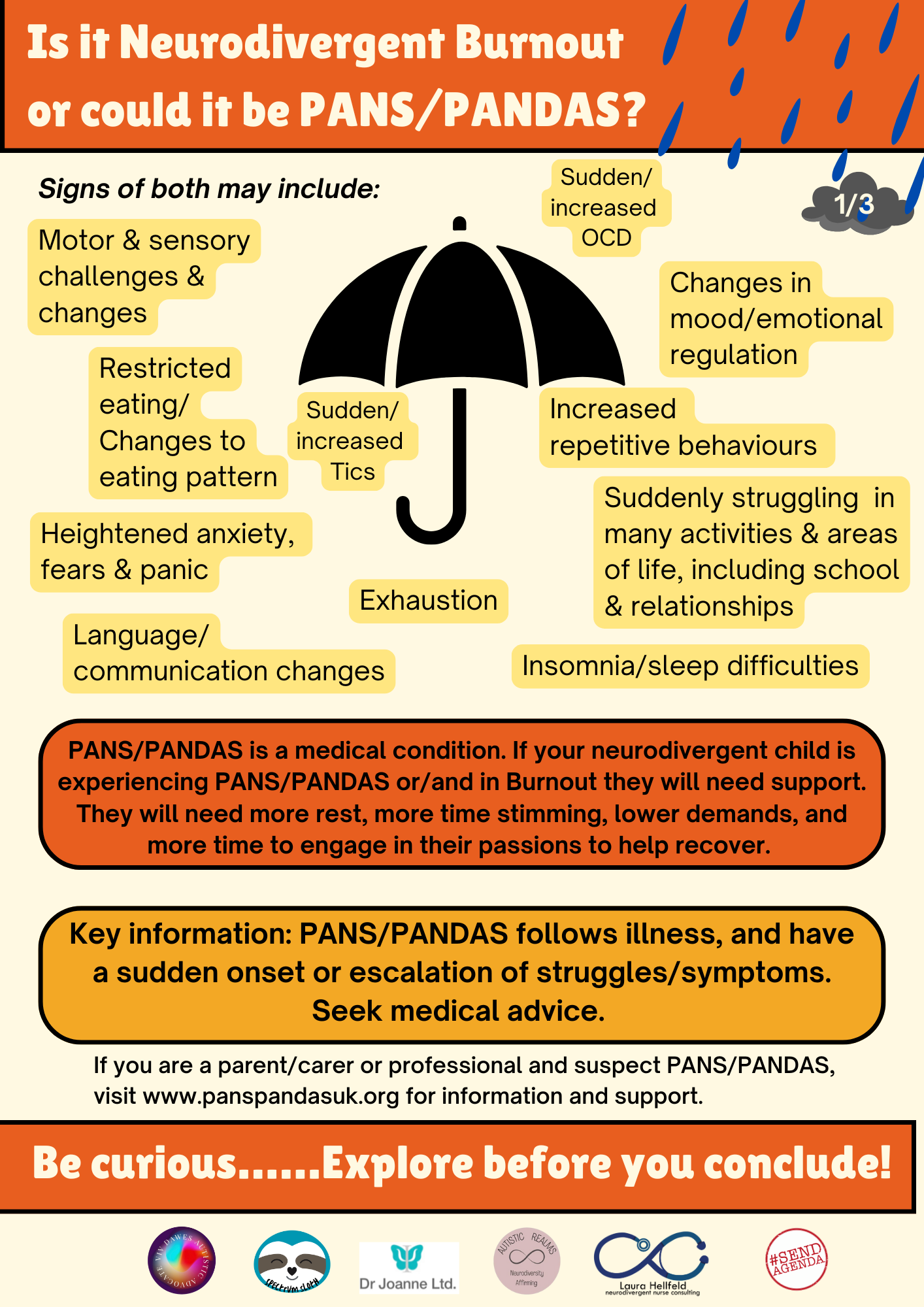This collection of text and images was created collaboratively by neurodivergent educators, working together to shine a light on this often-overlooked area of care.
Helen Edgar, Joanne Riordan, Laura Hellfeld, Viv Dawes, Julie Webb and Ben Palmer

Have you noticed a change in your child’s ability to cope with life or a decline in their well-being?
It is worth being curious about what may be going on.
If your child is neurodivergent and struggling, they may be experiencing neurodivergent burnout. However, if the change was sudden and may have been following an illness, it is also worth considering and finding out about PANS/PANDAS, especially if there has been a sudden onset or escalation of multiple unexplained changes following an illness. There are many overlaps between the presentation of PANS/PANDAS and burnout.
PANS and PANDAS are medical conditions. People with PANS or PANDAS may experience a variety of symptoms impacting mental and physical health and also the sensory system. Please seek medical advice if you think your child has PANS/PANDAS.


Signposting and Resources
- PANS/PANDAS UK
- PANS/PANDAS frequently asked questions
- PANS Life Facebook page
- PANS Australia and PANS Australia Facebook page
- PANS PANDAS Foundation Ireland
- PANS PANDAS Education with Shara Virlan
The following list was collated and shared by Romy Worthington
- Romy’s PANDAS/PANS and OCD Youtube Playlist: https://www.youtube.com/playlist?list=PL39925jJXko0mAIEKiO9k9TwOdKl9tJ4M
- Romy’s Instagram page with a lot of PANDAS/PANS posts: https://www.instagram.com/chronic.advocate?utm_source=ig_web_button_share_sheet&igsh=ZDNlZDc0MzIxNw==
- Information on antibiotics for PANDAS/PANS: https://www.pandasppn.org/antibiotics/
- Royal College of Nursing PANDAS/PANS information: https://www.rcn.org.uk/news-and-events/Blogs/pans-pandas-a-mysterious-and-debilitating-paediatric-disorder-180523
- When specific foods trigger brain inflammation in children: https://www.lymedisease.org/members/lyme-times/2023-summer-news/foods-trigger-brain-inflammation/
- Patient stories of brain inflammation: https://braininflammation.org/patient-stories/
- A parent talking about the importance of antiviral treatment when antibiotics don’t work: https://www.linkedin.com/posts/emiliametzel_weeklypans-activity-7192897265559097344-fDqn?utm_source=share&utm_medium=member_desktop
- Food Sensitivities: https://theconversation.com/people-can-have-food-sensitivities-without-noticeable-symptoms-long-term-consumption-of-food-allergens-may-lead-to-behavior-and-mood-changes-192570
- Finding a doctor:
- The Children’s E-hospital, Dr Ubhi: https://drtimubhi.com
- PANS PANDAS UK Facebook group: https://aspire.care/treating-pans/medications/
- Information on false FII allegations: https://panspandasuk.org/support-resources/safeguarding-and-fii/
- Stanford medicine PANS PANDAS Q&A: https://med.stanford.edu/pans/about/Q-and-A.html
- A Q&A with an expert on PANS and Lyme: https://neuroimmune.org/dr-shannon-delaney-interview/
- Info on Lyme testing: https://arminlabs.com/en/diseases/bacteria/lyme-borreliosis
- PANS PANDAS UK facebook group: https://www.facebook.com/groups/189721514954497
Disclaimer: The information shared in this blog is for informational purposes only and is not intended to replace medical advice, diagnosis, or treatment. Please consult a licensed healthcare provider for personalised support and care tailored to your specific needs.
Last modified: 22 July 2025


